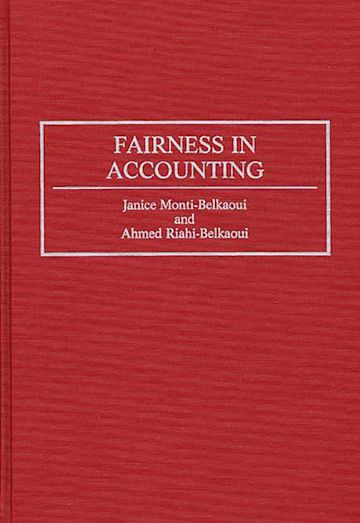This product is usually dispatched within 1 week
Free US delivery on orders $35 or over
You must sign in to add this item to your wishlist. Please sign in or create an account
Auditor's reports declare that the financial statements contained in them present fairly the results of operations and cash flows, in conformity with generally accepting accounting principles. Users of accounting information are guaranteed that the auditors have attempted to be fair in their presentation — but what does this actually mean, and are there other ways in which the fairness concept comes into play? Monti-Belkaoui and Riahi-Belkaoui explore these matters in concise, readable detail, not only for their colleagues in the academic community but for professionals in accounting firms as well.
Fairness has an important place in the practice of accounting. It is stated in the auditor's report that the financial statements present fairly the results of operations and cash flows for the year ended in conformity with generally accepted accounting principles. The statement presents to the users and the market the guarantee that the accountants (as preparers) and the auditors (as attestors) have strived to be fair. This conventional nature of the concept of fairness is fairness in presentation, connoting an idea of neutrality in the preparation and presentation of financial reports and the idea of justice in outcome. This view of fairness in accounting as fairness in presentation is rather limited calling for expansion of the notion of fairness to deal with distribution, disclosure and resource allocation considerations. Accordingly, the main objective of this book is to explain the conventional notion of fairness in presentation before elaborating on the more interesting notions of fairness in distribution, fairness in disclosure and fairness in resource allocation. Each of these concepts is presented in a separate chapter.
Chapter 1: The Fairness in Presentation will cover the conventional treatment of fairness in accounting as well as resulting limitations and consequences. Chapter 2:IFairness in Distribution will cover the contributions of various theories of justice (Rawls, Nozick, and Gerwith in particular) to different interpretations of fairness in accounting. Chapter 3: rness in DisclosureUsers will cover the avenues available for better disclosure to users in general that meet the interest of all the stakeholders. Chapter 4: rness and Entitlementl show how a moral authority espousing different theories of justice can reduce self-interest as it affects intrafirm distribution and disclosure. The book may be used as a guide to the understanding of the concept of fairness as fairness in presentation and to the expansion of the concept to deal with the more crucial issues of distribution, disclosure, and resource allocation. It should be of interest to members of the accounting profession and accounting students and researchers.
| Published | Feb 16 1996 |
|---|---|
| Format | Hardback |
| Edition | 1st |
| Extent | 192 |
| ISBN | 9781567200188 |
| Imprint | Praeger |
| Dimensions | 9 x 6 inches |
| Publisher | Bloomsbury Publishing |
Free US delivery on orders $35 or over
Your School account is not valid for the United States site. You have been logged out of your account.
You are on the United States site. Would you like to go to the United States site?
Error message.

